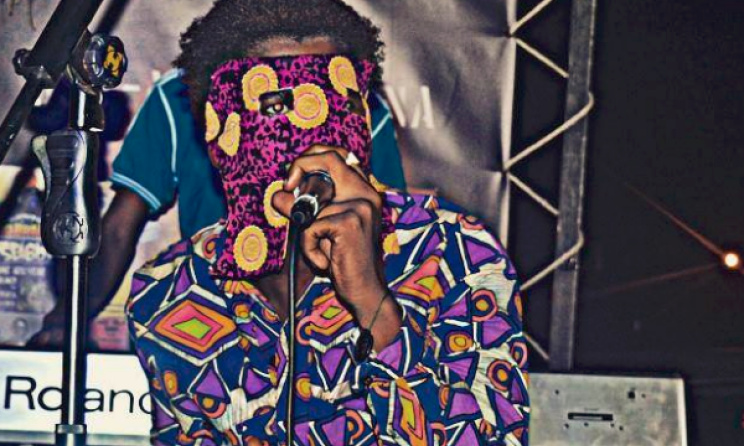Ghana-based artist Hym talks trap music
'Trippy trap' connoisseur and Davido collaborator Hym recently dropped a neo-soul, deep synth, Afro-trap single called 'Sober'. The song takes listeners on a smooth 1990s R&B ride infused with a perfect sample and pumping groove pattern.
 Trap artist Hym performs with mask. Photo: Facebook
Trap artist Hym performs with mask. Photo: Facebook
“It all started with curiosity,” says Hym about his beginnings. “Your experiences dictate what you put out. If you want to live a lifestyle different from the message in your music, there will be a resulting identity crisis. The industry is filled with a lot of people who don’t want to figure out things for themselves. It is filled with a lot of people who are dependent on others, expecting them to do something for them.
Born Mohammed Nasir to a Hausa family, Hym grew up in a large household in Lagos among individuals with varied tastes in music. “My dad could be playing country music. On my way home from school, the driver may choose to play reggae music. And Michael Jackson was everybody’s favourite at the time.”
His first recording was in a small studio in popstar Davido‘s house. “We were in high school then,” he says. We had the passion. We saw the picture. We wanted to make music. Davido bought the mic. He knew how to connect it to the computer so the sound was always good."
“I learned a lot from how he operated the software. I was lucky enough to start with and learn from somebody who had a lot of vim. I started writing music for the girls then. I got to see every sign of the perks in high school. One way or the other, everybody who was popular was exposed to the girls and also because you wouldn’t even have to spend your own money anymore because there was so much support.”
While Davido has gone on to be a pop star, Hym cuts the picture of the true independent artist. What with his peculiar genre and public image which sees him perform with a mask, usually made of cloth, covering his face. “An independent artiste for some reason has more clarity than the guy who is signed onto a label,” he says. “The independent artiste intuitively knows what to do with a beat as soon as they get the chance while the signed artiste has to go through all that tiring process of thinking about his contract, the content that the masses are used to or whether it would be a hit song or not.”
For Hym, music is not ‘work’ because that word “has certain formalities to it.” Access to space for music production and productivity are linked in Ghana. So that in Accra, several musicians end up sharing a common music recording studio at a time, and the realities of joining queues and distractions are frustrating facts that hinder inspiration.
“Inspiration comes to me in the form of a conversation or when I hear something interesting,” says Hym. “The process becomes more realistic too because we have a studio in the same apartment we live in, so it’s more like go in there and make a hit. With the labels, the creative process is usually dragged. Also when one visits the studio, there’s always a queue and you’d hardly be the most important person in there even if it’s your own session.”
About what artistry really means for the society, Hym says: “I feel that being a musician is a social responsibility and could be used to open minds about what could help the people. I don’t want people to think that I am all God with my music. I make music for club-goers too. It’s all about the feeling. I grew up in Lagos with the plan to go all out with the music.
“Along the way, people gave up, some even died. That meant I had to move and take the message elsewhere. People that know me back in Lagos have seen my music channel from party-type to conscious music. I’ve realized that it’s best for musicians to keep pushing. Even if it’s two radio stations for promo. Even with videos, over there (in the West), some people shoot with their phones. But we are socialized to think that we only need the red camera to make it because we saw Jay-Z and co. use it.
Hym calls trippy trap “the dope cousin” of Afro-trap. One Afro-trap rapper worth mentioning here is Dex Kwasi, who plots stories and sound moods about experiences, struggle, culture, drug politics etc. over afro-trap beats. The rhythm is not too far from an afro hip-hop and trap hybrid. Dex Kwasi first got a strong response when he dropped a satirical trap anthem and video “Africa (Trappin’)” featuring Wanlov.
Trippy trap, says Hym, “is the genre I mostly easily connect to. I used to call it Afro trap. My music is for people who have not figured life out yet. Almost every black man feels the need to cut his hair once it gets to the afro level. The afro signifies blackness or black mentality.
“The best part of the creative process is when I’m listening to the piece recorded," he adds. "I like to take the music from a different angle.”
Originally published on 13 February 2016 on the Kwamewrite blog.




























Commentaires
s'identifier or register to post comments